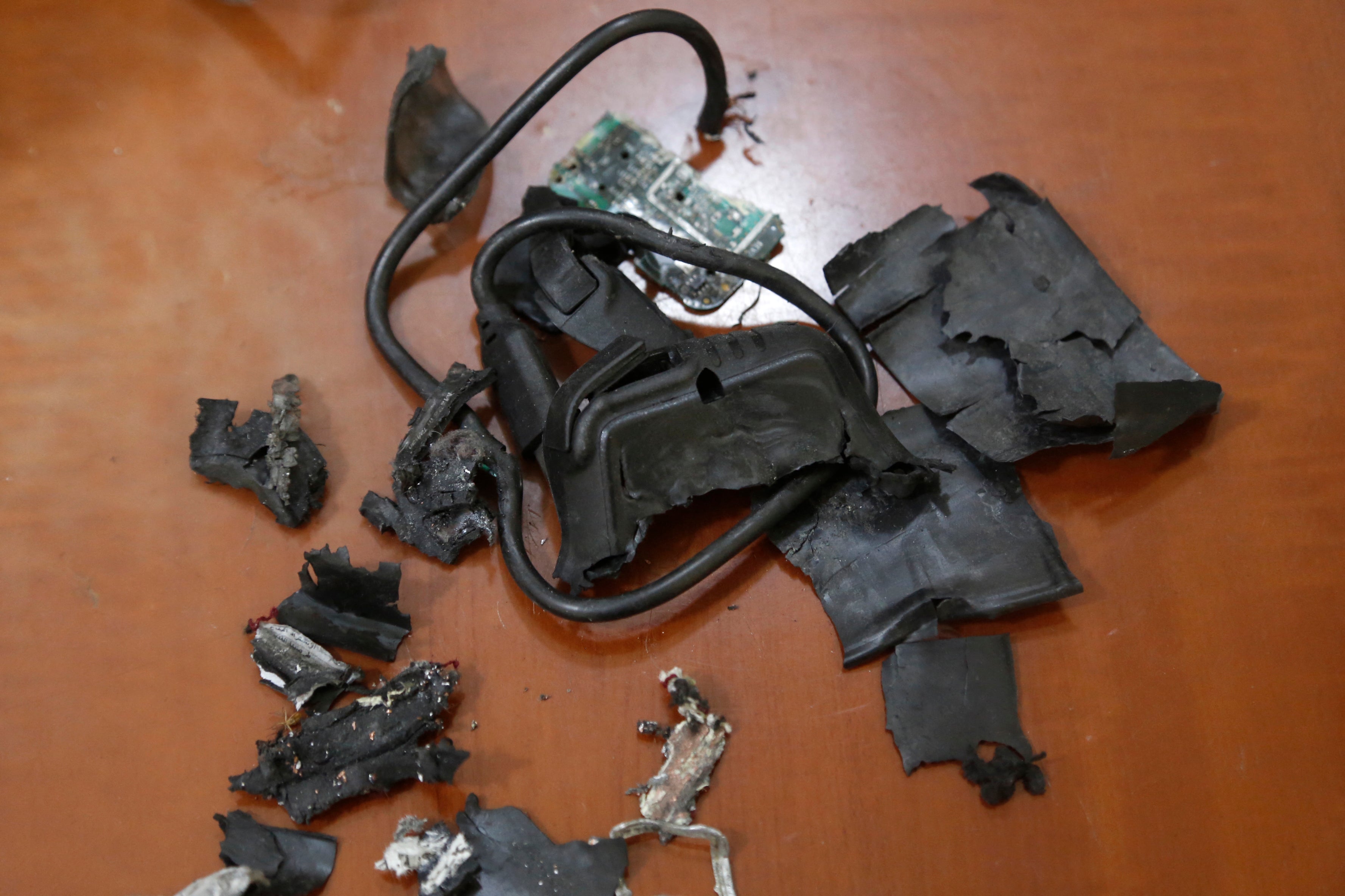From booby-trapped walkie-talkies to exploding pagers – could our phones and cars be next?
The use of old-fashioned tech to spark a series of deadly explosions across Lebanon and Syria has left many wondering, how safe are any of our devices? Technology expert Jonathan Margolis takes a closer look

The walkie-talkie radios were purchased five months ago around the same time as the innocuous pagers. Little did anyone know at the time that these small, everyday, slightly old-fashioned pieces of tech would months later become weapons in the initial stage of one of the most audacious and targeted attacks by a foreign state on enemy soil. An attack that would leave thousands injured, at least 12 dead in its first day, and more still in its most recent phase.
Even knowing that the current Israeli government has its vociferous critics – and mindful that alongside 3,000 injured at least two children have been killed – the imagination, logistics and scale of this week’s technology attacks by Israel’s secret services still demand a certain kind of awe. That they pulled off a series of exploding devices across Lebanon and Syria targeting the Iran-backed terror group Hezbollah is indeed the stuff of boys-own comic book legend.
From cartoons to manga and anime and exploding gadgetry in James Bond films – cigarettes, spectacles, alarm clocks and more – unlikely objects that unexpectedly blow up are a mainstay of childish intrigue across the world. One episode of Frasier even once had an exploding bowl of cherries in it, cementing our appetite and infantile love of unrealistic fictional versions of explosive surprises.

Even when, in the real world, crazy people plot chaos by means of unlikely explosive devices, it’s hard not to be captivated by how ludicrous some of the booby-trapped devices are, even more so when you are secure in the knowledge that they failed. Think only of Umar Farouk Abdulmutallab, who muffed up an attempt to use explosive underpants to bring down a flight in 2009.
The reality, however, as may well play out in the Middle East in the coming weeks, is that little good and a great deal of bad comes out of using technology to sabotage everyday objects.
There is nothing comedic about innocents being killed or maimed by exploding anything. And you would risk a sharp reply if you asked anyone who served in Afghanistan or Iraq how hilarious they found remotely controlled improvised explosive devices (IEDs) hidden in the likes of milk bottles and hollowed-out rocks.
The problem is that there are countries besides Israel that also have a near-psychotic brilliance at harnessing technology to cause mayhem, most pointedly China and Russia. The West and West-aligned Israel should know that provoking their inferiority complex is not good for anyone. Retaliation will be a matter of time.
Nobody outside of a few in Israel knows whether the detonating communication devices had a tiny piece of explosive inserted in them at some point in the supply chain, along with a little software update – or whether the potentially dangerous lithium batteries which all such devices come with were somehow weaponised.
Shorting out a lithium battery can set a device spectacularly on fire, which is why courier companies make special provision for packages containing this power source, and airlines won’t let you put devices in hold baggage. So, while one source claimed the beepers – believed to have been made by a Hungarian company with a licence to use Taiwan-based Gold Apollo’s brand – were modified “at the production level”, it could be that the specific alphanumeric text message that triggered the Hezbollah pagers did no more than produce such a short circuit.
Israel has world-leading experience of weaponising humdrum objects. In an earlier age, they used letter bombs to great effect. Among the country’s more recent successes in this area were the 1996 killing of Yahya Ayyash, a leading Hamas bombmaker in Gaza, who was killed by a rigged mobile phone, which blew up when he answered it.
In 2008, an explosive car headrest killed Imad Mughniyeh, one of the world’s most feared terrorist masterminds, in Damascus. Around the same time, Iran’s nuclear programme was infiltrated and almost destroyed by a virus – Stuxnet – that had been introduced to the Siemens computer system by a single USB stick.
And just weeks ago, Hamas’s political chief, Ismail Haniyeh, was tracked by his mobile phone to a guesthouse in Tehran and killed. Not quite the same thing, but in 2020, Iran’s chief nuclear weapons scientist, Mohsen Fakhrizadeh, was killed by a robot machine gun mounted on a pickup truck and remotely controlled by satellite.

But there has never been an attack as widespread and extensive as what we have seen this week. So the concern now for almost everyone in the world who has a mobile phone, a laptop, wireless headphones or almost any internet-connected gadget right up to a car, is how vulnerable are we all to malicious attacks?
“How long before Vladimir Putin or Xi Jinping works out how to make millions of iPhones around the world burst into flames in the pockets of their foes?” asked Mark Almond, director of the Crisis Research Institute, Oxford, in an article for the Daily Mail yesterday.
Could my wireless headphones, baby alert camera, or any number of other connected devices be configured by some bad actor to blow up? Could my new Chinese internet-connected car be remotely turned into a four-wheeled zombie killer by the Chinese government next time they have a disagreement with the West?
In the case of iPhones, the security of which is widely reckoned to be better than that of cheaper Android phones, the answer is probably not. As the security firm Kaspersky stated: “Fortunately for Apple fans, iPhone viruses are extremely rare, but not unheard of; over the past few years, some iPhone users have been able to recall the effects of Pegasus, a form of spyware spread through text messages, or AdThief, a form of adware that served unwanted advertisements from a pirate network.”
It should be noted, of course, that Kaspersky itself is regarded by the US as too tied to the Russian state to be trusted. The world that has been created by the interconnection of all the gadgets in it is complicated and often murky.
As for getting an explosive charge into even one iPhone or Android, let alone thousands, that’s probably not possible, which is why the tech brains behind the first of this week’s attacks went for old-school pagers. Fairly simple devices beepers date back to the early 1980s, and have pockets of space inside for the tiny amount – 10g is plenty – needed to become a small bomb. A modern smartphone, however, is packed to the last fraction of a millimetre with circuitry and other hardware. Finding space for new features in an upcoming phone model takes years of negotiation between teams at a company like Apple or Samsung.

Phone accessories like Apple’s ubiquitous AirPods would also be pretty much impossible to inveigle explosives into as they are hermetically sealed units and any tampering would be visible.
Nonetheless, this week’s outbreak of technology-based attrition could mean that, however unlikely a target we realistically are, everyone may from now on be looking at the tech toys less as an essential tool and more as a potential – however remote – threat.
Although Hezbollah has suffered a massive blow to pride and morale, as experts both in Israel and the rest of the world concurred yesterday, the attacks on communication devices is unlikely to make them give up. The heat of humiliation at the audacity of these attacks will mean, more likely, they double down in their beliefs.
Indeed, embarrassing Hezbollah and making them look stupid is likely to be counterproductive. While the Israeli attack was genius of its kind, the Iranian proxies in Lebanon are a potent military force and will doubtless be desperate now to prove that, and swiftly. Where the next booby-trap attack will come from will be anyone’s guess, but suddenly that old-fashioned pager doesn’t look like it will get dusted off anytime soon.




Join our commenting forum
Join thought-provoking conversations, follow other Independent readers and see their replies
Comments